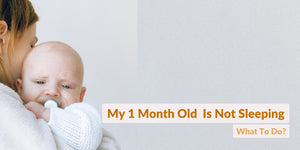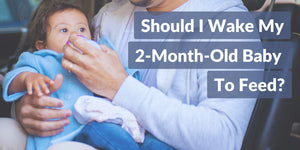Seeing your baby unwell can be very distressing. Cough is a common condition often associated with colds. Typically, babies catch a cold from their parents or caregivers.
Being a parent for the first time can make you anxious about your baby’s cough. You may be clueless as to what is making your baby cough and what you can do to calm your little one. It is also a good option to know a few home remedies for cough in newborn beforehand.
What Is Coughing?
Coughing is a reflex reaction that helps to protect and clear the airways. While it is commonly associated with colds or irritants like smoke, it may also occur due to other causes such as bronchiolitis or pneumonia. These are the different types of cough:- Persistent cough for more than 3 weeks.
- Whooping cough(pertussis) due to bacterial infection.
- Barky cough and stridor, which occur due to swelling of the voice box and windpipe.
- Cough with wheezing (a whistling sound when you breathe out) caused by problems in the lower airways, like bronchiolitis or asthma cough with a fever of 102° F or higher may be caused by pneumonia.
- Cough that worsens at night or day.
Recognizing the different types of cough can help you decide how to manage the cough at home and when to call your doctor.
Can You Manage Baby’s Cough with Herbal Medicines?
Although there are several over-the-counter cough medicines available on the market, the Food and Drug Administration (FDA) does not recommend the use of cough medicines in infants and children up to 2 years of age as they are not safe.
It has been scientifically proven that Indian home remedy for baby cough like liquorice, tulsi, ginger, cinnamon, garlic, and many other herbs are effective against cough.
However, the one important thing you should always bear in mind is: do not give your baby any medication without consulting your paediatrician.
Home Remedies To Treat Cough in Newborn
Typically, coughs due to colds may last for up to two weeks. Following these home remedies for cough in newborn can help soothe your little one.- Keep up your baby’s fluid intake. Good hydration will thin the mucus and make it easier to cough it up.
- Stick to breast milk or formula if your baby is younger than six months. After the age of six months, you can feed your baby warm, clear fluids. You may try giving 5–15 ml of warm lemonade or apple juice four times a day.
- Use saline nasal spray or drops to soften the dried mucus and then suction or blow out the mucus.
- Make sure the baby is comfortable and gets plenty of rest.
- Never give honey until your baby is a year old.
- Use a humidifier at home to reduce the dryness in the baby’s nose and throat. If a humidifier is not an option for you, run a hot shower, close the bathroom door, and let the steam build up. Hold your baby in the steam-filled bathroom for about 15 minutes.
- Take your baby outdoors for about 10 to 15 minutes, as the cool air may ease the cough. Ensure that you have dressed your baby suitably for the weather.
- Indoor allergens such as dust mites, air fresheners, pet hair, mold, paint, and cigarette smoke may cause asthma or cough. Avoid exposure to such allergens as much as possible.
- Vapor rub may irritate children due to its strong smell.
When Should You See A Doctor?
When to take a newborn to the doctor for cough is the question that bothers every parent. Here are the following symptoms for which you need to see your paediatrician:- Struggling to breathe (can barely cry) breathing faster than normal.
- Retractions (ribs pulled in) with each breath
- Stridor (a harsh sound) when inhaling.
- Wheezing "whooping" sound when inhaling after coughing.
- More than 102°F fever with tinges to the lips, tongue, or face
- Weakness and crankiness
- Coughing up blood
- Cough for several hours or fever if your baby is younger than three months
- A cough that causes vomiting three times or more
- Cough that lasts more than three weeks
- Due to the COVID-19 pandemic, you should call your doctor right away if you notice warning signs like trouble breathing, bluish lips, confusion, or being unable to drink any liquid.
Cough is a common problem in infants. However, every type of cough does not indicate a serious condition. As a mom, you may be concerned about your baby being restless due to coughing.
However, stay calm, observe the symptoms, and try home remedies for cough in newborn if your little one is otherwise healthy. If your baby exhibits any of the above warning signs, immediately consult your paediatrician.
Discover a glossary of nutritious recipes, a milestone tracker, and activities perfect for your little one on their development journey on the go, only on your BabyG App today!
References:
- Cleveland Clinic. Common cold in babies [2021].
- Kid’s health. Coughing [2021].
- Seattle Children’s. Cough (0-12 months) [2021].
- Seattle Children’s. Cough Meds or Home remedies [2021].
- Asthma UK. Indoor asthma triggers [2021].
- Johns Hopkins Medicine. Coronavirus in babies and kids: Symptoms and prevention. [2021].













This was a helpful article. Thank you.
This was a helpful article. Thank you.